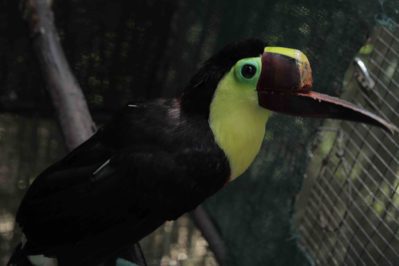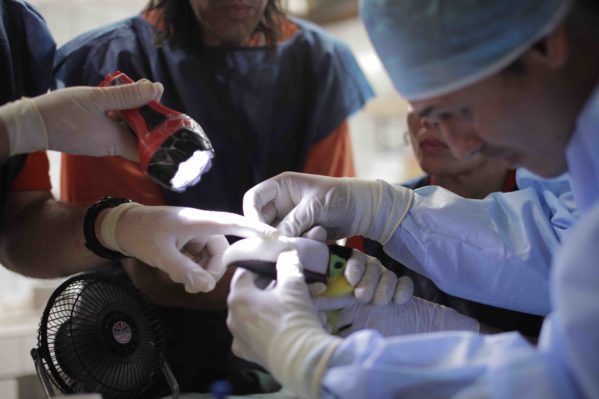INTERVIEW: In ‘Toucan Nation,’ abused toucan receives new beak, starts a movement

The story of Grecia, a toucan from Costa Rica, is simultaneously tragic and uplifting. The iconic bird was horribly abused and saw its beak chopped off. A bloody stump and the prospects of dying became a reality for Grecia, that is until a movement was born around the sad images of this powerfully resilient bird. Activists, veterinarians, animal rescuers and politicians in Costa Rica rallied behind the toucan, demanding justice and finding a way to save this exquisite symbol of the rainforest.
The plight and flight of Grecia are the subject of a new documentary on Animal Planet from director Paula Heredia. Toucan Nation is set to premiere Wednesday, Aug. 24 at 10 p.m.
“What really got us in terms of the story was not just the fact that there had been this horrible abuse to an animal,” Heredia said recently in a phone interview. “It happens quite often unfortunately, but it was the fact that it had moved Costa Ricans and had made this movement that people actually [were] taking actions.”
Costa Rica, located in Central America, has a wonderfully verdant landscape that has become an international destination for eco-tourists. Visitors and locals alike can navigate trails in rainforests, cloud forests and atop volcanoes. Flora and fauna abound in great numbers thanks to a perfect climate and steady rainy season. The biodiversity is quite simply legendary, and it’s remarkable that a single bird can inspire a nation with so many species. From toucans to resplendent quetzals to tapirs to howler monkeys to fer-de-lance snakes, the animals of this Eden-ic environment are a marvel to behold.
“Costa Rica is usually known for being a green country and a country that’s very aware of their role in terms of being ahead on the law for issues related to animal welfare,” said Heredia, who is part Costa Rican. “That’s where all these activists, and legislators and even the president [came in] to say we need to fix the law and make a better law that will protect wild animals.”

Heredia said she sees many universal elements in Grecia’s story, and that’s what attracted her to the project. Although the director looks for these universal themes, she prefers to tell the actual story from a local perspective. In Toucan Nation, she follows three storylines: the story of Grecia from the moment of crisis to the bird’s rehabilitation at ZooAve Rescue Center in La Garita, Alajuela; how Grecia affected the law in Costa Rica; and the concern of veterinarians, scientists and engineers who came together to figure out how to reconstruct a new beak for the toucan.
“Many, many times we were very concerned that the bird was not going to survive,” the Emmy-winning director said. “Those three storylines, I knew that if I follow them, if I had an experience that I could translate to my audience, the story would be translated in a way that would become universal and also that could be a piece that would open conversations in any country it would be seen.”
The technology that was used to reconstruct Grecia’s beak is quite cutting edge. Using 3D printing and a team of engineers, the toucan was given a sturdy prosthetic and subsequent second chance at life. “I mean, of course, it’s fascinating for me who knew nothing about it in terms of the technology,” Heredia said. “It just blew my mind, but it was also interesting how fascinated the technicians … were about the fact that technology could be used for something like this. 3-D printing could be used to right a wrong. It was not designed to do that, but it could be applied if you felt something needed to be done. And then you use your resources to do it. In their case, it was, ‘Well, we have this technology. Maybe it can work.'”
Heredia said that the response to Grecia from the Costa Ricans tapped into something quite deep in their culture. This yearning to make a change doesn’t start with nature, in the director’s eyes. It actually starts with the country’s unique political and social history. Heredia sees the population as a fourth estate, having power to make changes and offer influence over policymaking. For example, the people of Costa Rica can bring a bill before their legislature if they receive enough signatures. This gives them ownership over their country and its path into the future.
“They are invested in their country in a way that many other countries are not,” Heredia said. “They feel that they are responsible of a little piece of what the world needs in terms of nature. They take it very seriously and not just in terms of demanding things should be better, but working to make it better, and that’s what I found in terms of Costa Ricans. They believe they have rights, and they believe that they have a responsibility to get the rights that they have.”
Grecia was the beneficiary of their inspiring fortitude, and it was this rallying cry that kept Heredia fascinated by the project. “I think what I’m interested in general with the work that I do is what do we learn from people within the grassroots and doing work where they are actively doing something, making change and developing things that are going to improve human rights, or the rights of children or the rights of others, in this case the rights of animals,” she said. “I think that’s what’s in common in terms of a lot of the work that I do. In my heart, I think there’s so much that we can learn from what others are doing.”
Heredia, who directed In Memoriam: New York City, 9/11/01, remembered one recent memory at a screening of Toucan Nation in Costa Rica. In the audience were many activists and government personnel, and they soon realized their common cause.
“Everybody was there, and someone made a comment which confirmed what I’m saying,” she said. “They all work in the same field. They all work fighting for the same causes, but they never thought about the others doing work that was adding up, that they themselves were doing. And seeing themselves on the screen and seeing the work of all of them on the screen makes them realize that they’re not alone, that they can learn from what the others are doing.”
By John Soltes / Publisher / John@HollywoodSoapbox.com
Toucan Nation premieres Wednesday, Aug. 24 at 10 p.m. on Animal Planet. Click here for more information.


I had to come online to try to learn why the Toucans were being abused in this way: the beaks have a mystical value, they are used for ornaments? However, how sad to learn it was just for the thrill of abusing a beautiful animal. Many thanks to Ms. Heredia and others in the cause. Hopefully, Costa Rica will reap the benefits of preserving the beauty of this animal!